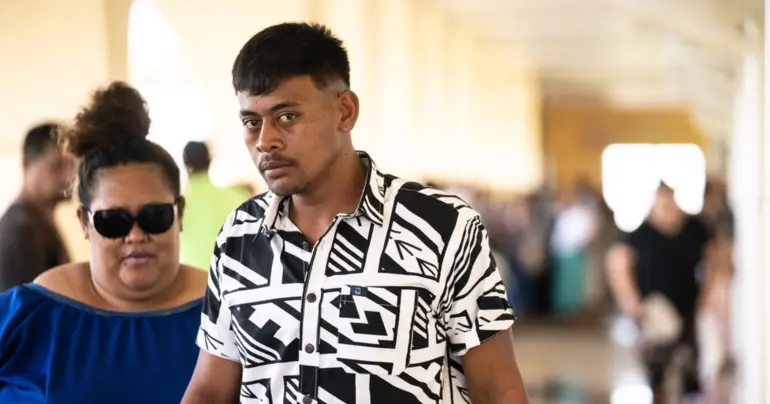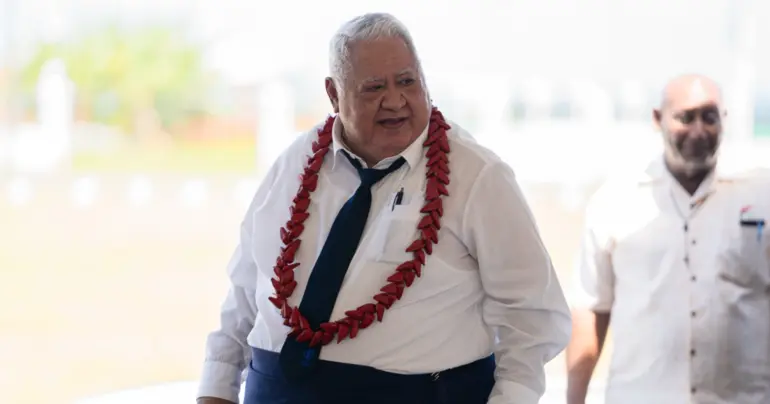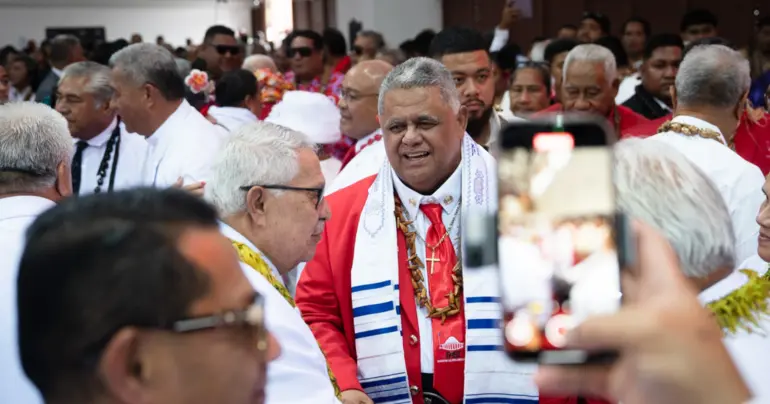Strong opposition key election result: Leasiolagi
 By Sapeer Mayron
•
10 April 2021, 11:00AM
By Sapeer Mayron
•
10 April 2021, 11:00AM
The head of the Centre for Samoan Studies at N.U.S. is hoping the next Government, no matter who leads it, will face a strong opposition in the next Parliament encompassing at least one-third of M.P.s.
Leasiolagi Dr. Malama Meleisea said he wants an end to what he calls the “tyranny of numbers,” where the ruling party can amend laws or pass new ones to suit their agenda without a debate in the house.
He says by now, nearly 60 years after independence, Samoa’s government needs that debate more than ever.
“Whichever party is in power needs a strong opposition at the point in Samoa’s development,” he said.
“I am aware of the fact that the governing party has evolved into quite a strong machinery in every way and that is not healthy for the country. Room for dissention is getting smaller and smaller and smaller.
“That is very worrying. People offering alternative perspectives are not encouraged.”
In Parliament, a bill or resolution can be passed with a two thirds majority vote by the Members, which total 51.
If a party is to have at least a third of its members in Parliament it needs to win minimum 17 seats, but more would a stronger opposition.
“More than a third [would] prevent this situation where laws are being passed simply because whenever the Government wants laws to be passed to support what they want, they can do it.
“I call it sometimes a tyranny of numbers, to force issues without proper consultation and debate. Right now and for the last 10 years that has been the case.”
But once those numbers have been gained, the work doesn’t stop there, Leasiolagi warned. Whoever is in opposition will also need to be ready to debate the ruling party on whatever issues they raise in Parliament.
Those debates, broadcast on television, radio, online and in print, tell constituents what their leaders are doing with their vote. It’s a process that has been missing, the Adjunct Professor said.
“We need to move governments back to a situation where people can say and argue alternative points of view, that has clearly been missing over the last 10 years.
“It’s not just the numbers, when they are there I hope they do their homework properly and that when they speak, they speak with authority based on research.
“It’s a way of educating the public about public debate in Parliament, and for people to listen. Everyone has access to radio and TV nowadays [and] it’s the responsibility of Parliament to educate voters through what they say in parliament, and outside parliament.”
He said while in Samoa’s past, a multi-party Government made up of a ruling party and viable opposition could have felt less important, that time is over.
And though leaders have touted the Human Rights Protection Party’s 40 year rule as serving the country’s stability in the region, Leasiolagi said that is not enough reason to discourage opposition.
“For 10 years after independence there was no party and it was okay for that time when the country was still recovering from colonialism and a sense of nationalism was being fostered.
“Not long after that one party became very dominant. People refer to stability, from the perspective of investors and partners and things like that and you can say that but I think for the process of governance here I hope the next parliament will have a good number of people officially termed as opposition to speak up and present alternative views to those being presented by which ever party is in power.”
But this year a new party, less than a year old, presents a viable opposition to H.R.P.P. and may stand a chance of gaining 17 or more seats in the next Legislative Assembly.
Faatuatua i le Atua Samoa ua Tasi (F.A.S.T.) was formed in July last year by a former H.R.P.P. member, and three others soon joined to form its leadership.
At the helm of the party and vying for the top job of Prime Minister is Fiame Naomi Mata’afa: former Deputy Prime Minister (and Samoa’s first woman in the role), and one of the longest serving M.P.’s in the country.
“In a way this is probably one of the first interesting elections,” Leasiolagi said.
“When H.R.P.P. was first voted into power way back in 1982 it was a transition from a non-party system to a political party system. Now you have a reasonable challenge from another party.
“When I say reasonable challenge I meant there were other political parties before but they were not as well organised as F.A.S.T., at least that’s the way it looks to me. There is a genuine competition for people’s votes.”
F.A.S.T. and H.R.P.P. have appeared as the two leading parties in this year’s election. After four days of pre-polling, where around 7,400 people cast their votes (around six per cent of the population), the two parties’ candidates took the lead in all but two constituencies.
Leasiolagi said the way they have each been campaigning is worth analysing.
The incumbent, whose leader Tuilaepa Dr. Sailele Malielegaoi has been running the party for half of its 40 year rule, has a long history of achievements to point to on the campaign trail.
“Some of the advertisements I have seen of some of those projects are sort of saying they are H.R.P.P.,” Leasiolagi said. “I think they are Government projects rather than H.R.P.P. projects.
“They do have that advantage of pointing to these things.
“On the other hand, it has been used by opponents of H.R.P.P., not just F.A.S.T., to say there is all this but what about the debt, what about the way the country has been treated?”
On the other hand, while the F.A.S.T. party membership includes some political stalwarts and former public servants, as a party they are too new to have any kind of record of achievement in the public eye, he said.
Instead, their campaign has focused on what it doesn’t like about the current leadership’s style and choices, and on what F.A.S.T. would do differently given the chance.
“I think F.A.S.T. are probably back footing when it comes to that. But from what I have seen so far and in the last couple of days, the F.A.S.T. message has gotten through to a few people
“There is a genuine debate for and against both parties about governance.”
Another key pillar for both parties has been faaSamoa and cultural preservation, Leasiolagi said.
They have both argued they are the party to defend and protect the Samoan way and its customs, either through a new suite of laws, or through dismantling those same laws.
The Land and Titles Court Act 2020, Judicature Act 2020 and Constitution Amendment Act 2020, passed in December last year after nine months of intense debate and scrutiny into their potential impact on Samoa.
Critics argued the bills collectively upend the rule of law in Samoa by eroding the separation of powers between Government, Parliament and the Courts, by removing the authority of the Supreme Court from the Land and Titles Court, and giving the Government more power to fire and discipline judges.
But despite the criticism, Prime Minister Tuilaepa and his party members insist the three bills, now formally part of the law, is about protecting Samoans communal rights and its customs under the law.
“H.R.P.P. is saying the bills are being introduced as a way of preserving sovereignty of fa’aSamoa through the Land and Titles Court.
“On the other hand a lot of people in F.A.S.T. are saying we represent fa’aSamoa because of the way we deliver, because we worry about what is going to happen to the land, about how government is making laws to influence families in terms of who the title holders will be and how many.
“On that count both parties are arguing that they stand for or symbolise cultural preservation.”
In their pre-election manifesto, the F.A.S.T. party has promised to amend or repeal laws that “are in conflict with the Constitution that compromise the independence and duties of Parliament, the Judiciary and the Executive.
“Some will be repealed while others amended so that the legislative framework can provide adequate support to the socio-economic development of Samoa.”
 By Sapeer Mayron
•
10 April 2021, 11:00AM
By Sapeer Mayron
•
10 April 2021, 11:00AM











